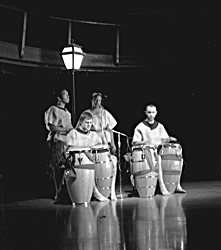

This year's production of Essence isn't like anything that has recently come out of Oberlin's theater and dance department. Just two weeks after the department's huge production of Spring Back, Oberlin's attention might seem saturated by dance. But Essence can't be limited to the simple category of a dance concert. The three pieces that comprise Essence this year combine theater, dance, installation and music, in a program that is incredibly energetic and entertaining.
"We're putting art and dance together to move Essence to a new level," said Essence co-director Adenike Sharpley. The Essence concert is the main presentation of a 300 level class taught by Sharpley and professor of African-American Studies Johnny Coleman. "This is much more involved than just a dance concert. The students have had to use many different tools. They've had to use art techniques, dance techniques, sound techniques. It is a collaboration of all arts together," said Sharpley.

This foundational change is obvious from the beginning of the show, which starts with a two part piece titled "Clearing the Road." "Clearing the Road" starts in a very theatrical way, with the lights rising on an industrial looking installation at center stage. The sound design at the opening is particularly good, with sound bytes of metallic clinking serving as a foundation over which the performers tell of their relationships to the African traditions of their performance. While the voices of the three male s become increasingly interwoven, the performers themselves progress slowly onto stage, dragging behind them a long chain, which is eventually added to the installation.
The themes of "Clearing the Road" revolve around Ogun, an orisha, or spirit from the African Yoruba tradition. The second half begins as the performers move to drums at stage left and begin to play and sings songs about Ogun. The songs which are led by college first year Tai Collins, whose incredible voice is one of the most memorable things of the evening. Collins, who was featured with the Oberlin Jazz Ensemble's tribute to Duke Ellington, performs this set of songs with a stunning amount of energy.
Collins voice was not the only high point of this piece. The drumming led by college sophomore Matthew Hill was exceptionally driven, and the interaction of all the performers was very focused.
If "Clearing the Road" paid homage to the traditions of African music, "Dissonant Soul," a dance duet by college first-years Anika Adilifu and Emilie Varlet, was much more concerned with more modern forms of African-American art . Set to the music of trumpeter Kamau Adilifu, "Dissonant Soul" was lyrical and effective, relying on simple costume choices that left the piece free from unnecessary clutter. The second part of the work, a solo by Adilifu relied on recorded text read by college senior Pyeng Threadgill was fluid and visually beautiful.
The directors of Essence truly saved the best for last with "Los Compadres," which was by far the most involved work of the evening, utilizing a complicated set , sound design and costuming, as well as the largest cast. The choreography for four dancers by college first-year Ni'ja Whitson was remarkably elaborate. The ensemble of dancers was well-rehearsed and energetic. The music, which integrated live and recorded performance ended the program with the kind of drive that the evening deserved.
Essence is moving in new directions. Under the direction of Sharpley and Coleman the students of Essence have put together a very diverse and short program that is one of the most memorable performances hosted by Oberlin's theater and dance department this year.
Essence runs April 23-24 in Warner Main Space. Tickets are $2 and are available through CTS.
In essence, they're drumming Matthew Hill leads a tight ensemble of drummers during the opening piece. (photo by Stephen Menyhart)
Copyright © 1999, The Oberlin Review.
Volume 127, Number 21, April 23, 1999
Contact us with your comments and suggestions.